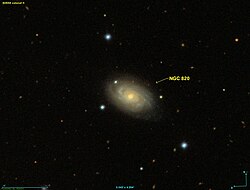NGC 820
| NGC 820 | |
|---|---|
 SDSS image of NGC 820 | |
| Observation data (J2000 epoch) | |
| Constellation | Aries |
| Right ascension | 02h 08m 24.97482s[1] |
| Declination | +14° 20′ 58.5388″[1] |
| Redshift | 0.01477[2] |
| Heliocentric radial velocity | 4395 km/s[2] |
| Distance | 213.5 Mly (65.46 Mpc)[3] |
| Apparent magnitude (B) | 13.7[2] |
| Characteristics | |
| Type | Sb[2] |
| Other designations | |
| UGC 1629, MCG +02-06-036, PGC 8165[2] | |
NGC 820 is a spiral galaxy located in the constellation Aries about 210 million light-years from the Milky Way.[3] It was discovered by British astronomer John Herschel in 1828.[4][5][6][7]
One supernova has been observed in NGC 820: SN 2002ea (type IIn, mag. 17.7).[8]
See also
References
- ^ a b Brown, A. G. A.; et al. (Gaia collaboration) (August 2018). "Gaia Data Release 2: Summary of the contents and survey properties". Astronomy & Astrophysics. 616. A1. arXiv:1804.09365. Bibcode:2018A&A...616A...1G. doi:10.1051/0004-6361/201833051.
- ^ a b c d e "NGC 820". SIMBAD. Centre de données astronomiques de Strasbourg. Retrieved 2020-05-24.
- ^ a b Tully, R. Brent; Courtois, Hélène M.; Sorce, Jenny G. (2016). "Cosmicflows-3". The Astronomical Journal. 152 (2): 21. arXiv:1605.01765. Bibcode:2016AJ....152...50T. doi:10.3847/0004-6256/152/2/50. S2CID 250737862. 50.
- ^ Ford, Dominic. "The galaxy NGC 820 - In-The-Sky.org". in-the-sky.org. Retrieved 2020-03-18.
- ^ Rojas, Sebastián García. "Galaxy NGC 820 - Spiral Galaxy in Aries Constellation". Telescopius. Retrieved 2020-03-18.
- ^ "Your NED Search Results". ned.ipac.caltech.edu. Retrieved 2020-03-18.
- ^ "Revised NGC Data for NGC 820". spider.seds.org. Retrieved 2020-03-18.
- ^ Transient Name Server entry for SN 2002ea. Retrieved 2 April 2023.
External links
 Media related to NGC 820 at Wikimedia Commons
Media related to NGC 820 at Wikimedia Commons
